| Srl | Item |
| 1 |
ID:
137582
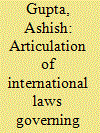

|
|
|
| 2 |
ID:
132325


|
|
|
|
|
| Publication |
2014.
|
| Summary/Abstract |
This article examines compliance with international laws prohibiting the intentional targeting of noncombatants in interstate war, specifically focusing on the role of third-party states in enforcement. We argue that the expectation of third-party coercion, when sufficiently high, can induce war participants to comply with this body of law. We identify the conditions under which combatant states will anticipate a high likelihood of coercion, demonstrating that third-party states are most likely to coerce combatants when they have both the willingness and opportunity to do so. Democratic third parties that value the rule of law and human rights possess the willingness to coerce war participants, while strong allies, trade partners, and intergovernmental organization (IGO) partners with existing ties to the combatant state have the opportunity to engage in coercion by linking combat-ant behavior to the provision of benefits or imposition of costs. Based on this logic, we hypothesize that war combatants who have ratified the Geneva/Hague Conventions prohibiting the intentional targeting of noncombatants during war are more likely to comply with the legal obligations included in those conventions when they interact with relatively strong democratic alliance, trade, and IGO partners. In a series of quantitative tests on a data set of all interstate wars from 1900 to 2003, we find strong statistical and substantive support for the role of third parties in inducing compliance with the law.
|
|
|
|
|
|
|
|
|
|
|
|
|
|
|
|
| 3 |
ID:
093749
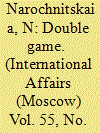

|
|
|
|
|
| Publication |
2009.
|
| Summary/Abstract |
SO FAR HISTORIANS AND POLITICAL SCIENTISTS have failed to arrive at a more or less concerted opinion about World War II, which marked a turning point in the history of the 20th century. In recent years, the discussion has spilled beyond academic frameworks. It means that new eloquent facts and documents are no longer enough to uphold one's opinion: the entire ideological concept the Western experts apply when dealing with the events and evidence of the 1930s-1940s should be refuted.
|
|
|
|
|
|
|
|
|
|
|
|
|
|
|
|
| 4 |
ID:
128904
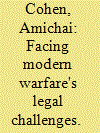

|
|
|
| 5 |
ID:
133651
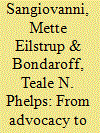

|
|
|
|
|
| Publication |
2014.
|
| Summary/Abstract |
We analyze forms of environmental activism that eschew the "information and socialization" politics typically associated with Transnational Advocacy Groups (TAGs) and instead favor direct, confrontational strategies, whose aim is to enforce international law. While mainstream TAGs typically seek influence through norm entrepreneurship, lobbying or "naming and shaming", what we label Direct Enforcement (DE) intervenes directly to halt (purportedly) illegal practices by states and private actors. DE activism has been most visible in transnational campaigns to protect endangered marine species, where environmental groups have resorted to damaging equipment used for illegal fishing and boarding fishing boats to enforce maritime conservation law. Often branded as eco-terrorism, such confrontational strategies have been largely ignored by scholarly literature on transnational activism. We contend that DE merits closer attention by IR-scholars for two reasons. First, DE activism plays an important role in enhancing the compliance pull of international laws in an area-the global environment-where states often lack capacity and political will to enforce international agreements. Second, an analysis of DE-activism provides important insights about issue selection and relative campaign success under different structural circumstances, thereby expanding our understanding of transnational advocacy more generally.
|
|
|
|
|
|
|
|
|
|
|
|
|
|
|
|
| 6 |
ID:
130041
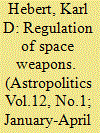

|
|
|
|
|
| Publication |
2014.
|
| Summary/Abstract |
The use of outer space continues to grow and is becoming more congested, competitive, and contested. This results in an increased need to ensure its protection. Existing international laws do not adequately regulate debris-causing space weapons and only provide restrictions for weapons of mass destruction. This article argues that there is a valid need to regulate space weapons, given the destabilizing effects of space weapons and the overall threat to the space environment. The article culminates with recommended courses of action for how to regulate space weapons.
|
|
|
|
|
|
|
|
|
|
|
|
|
|
|
|